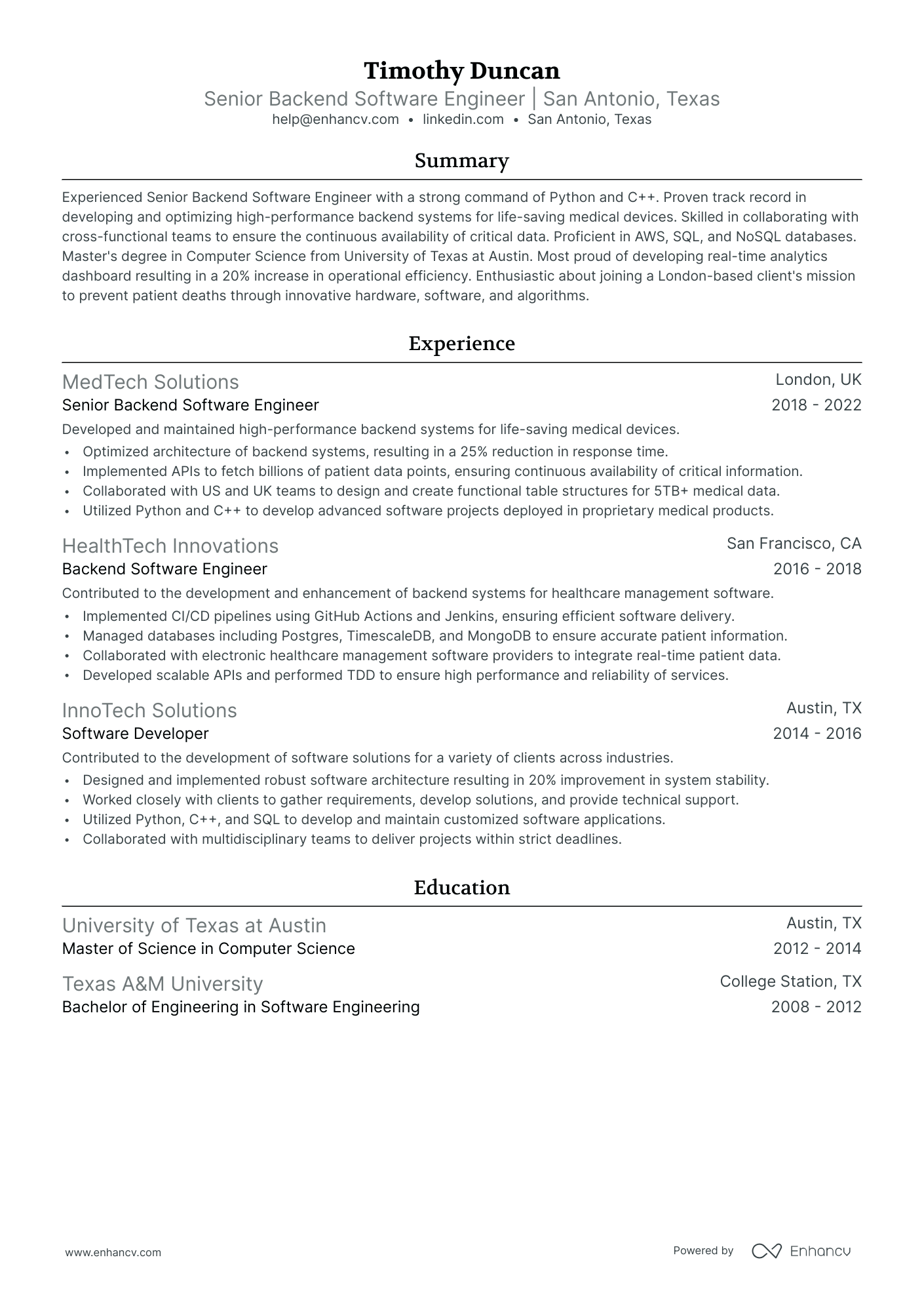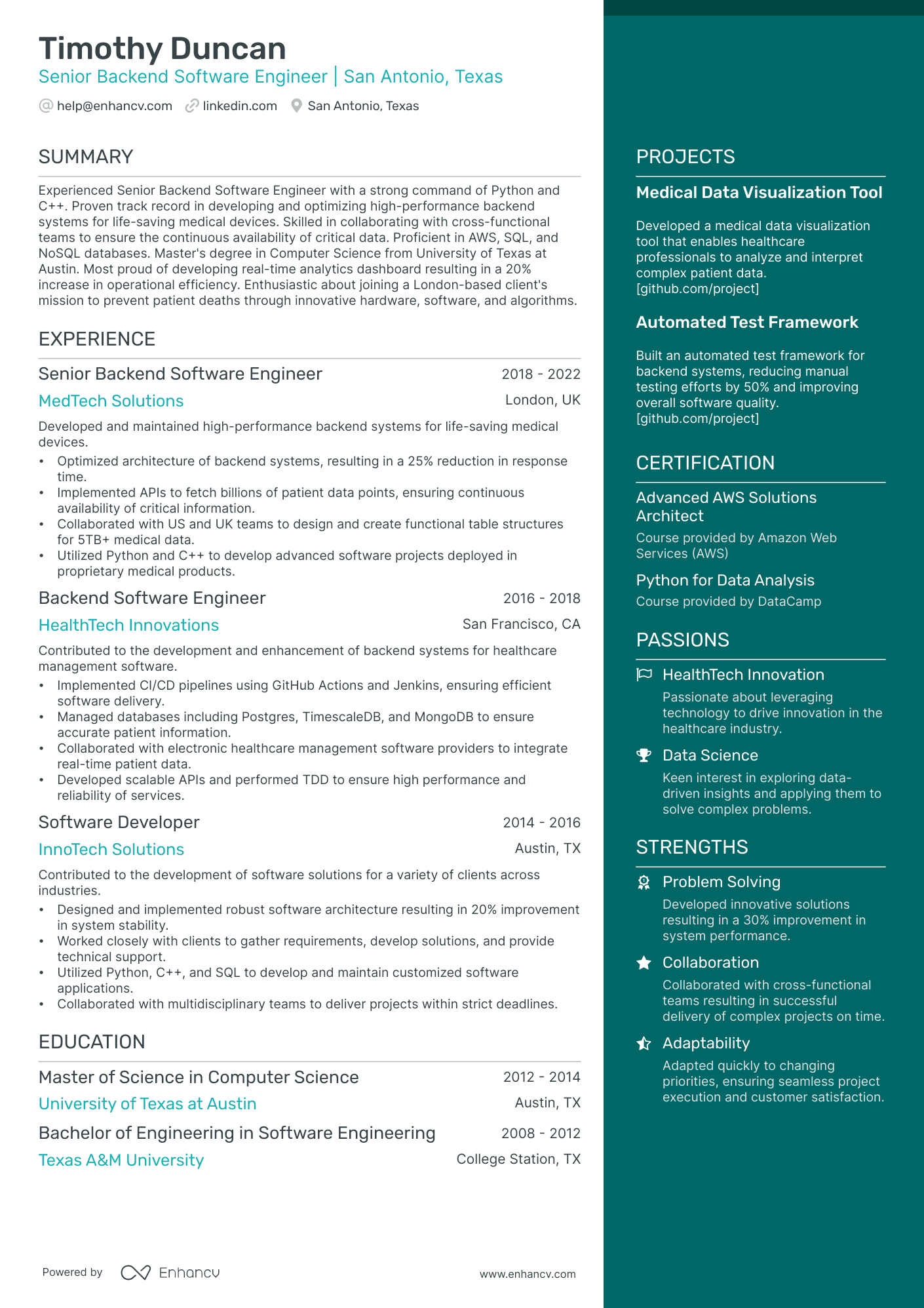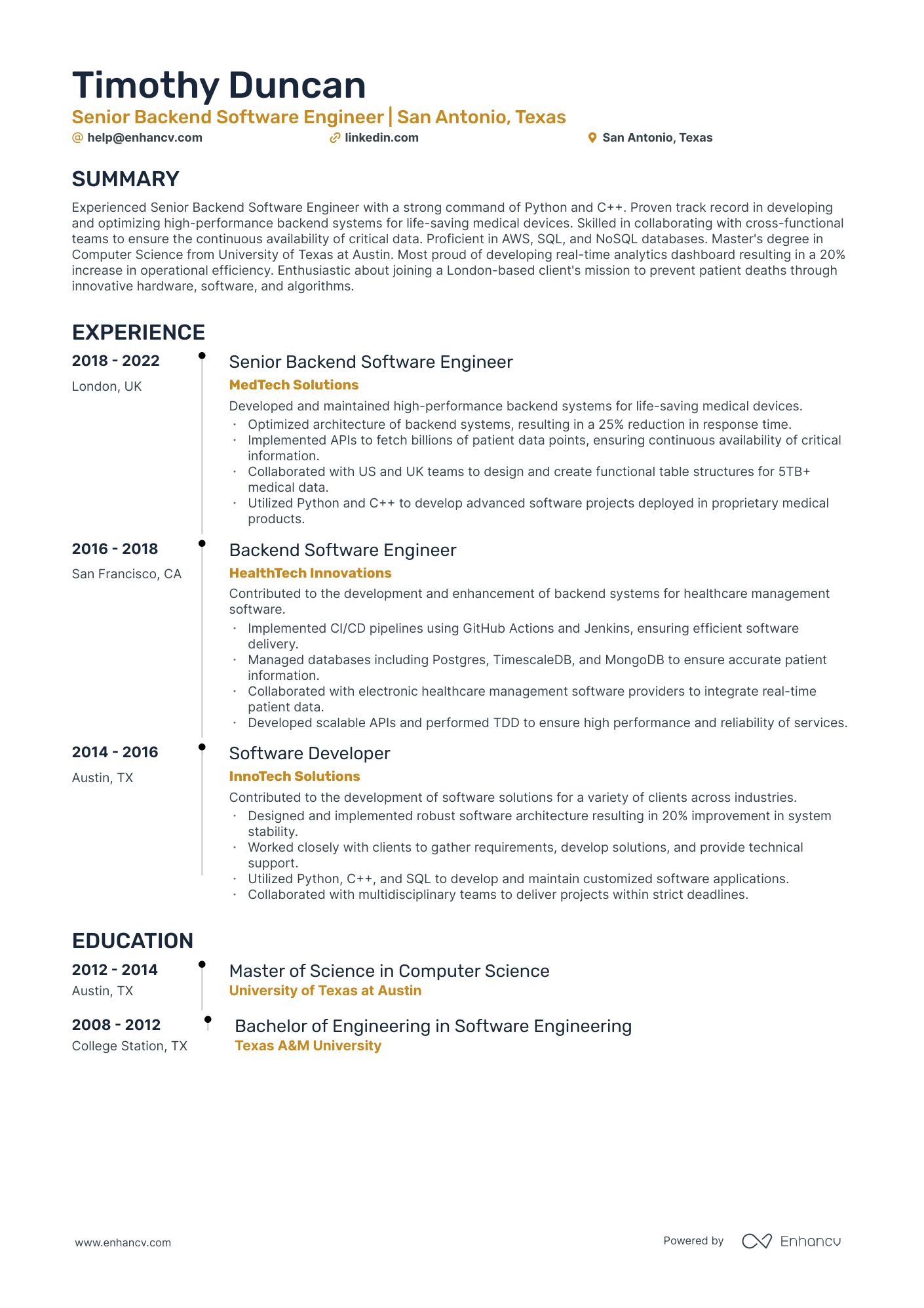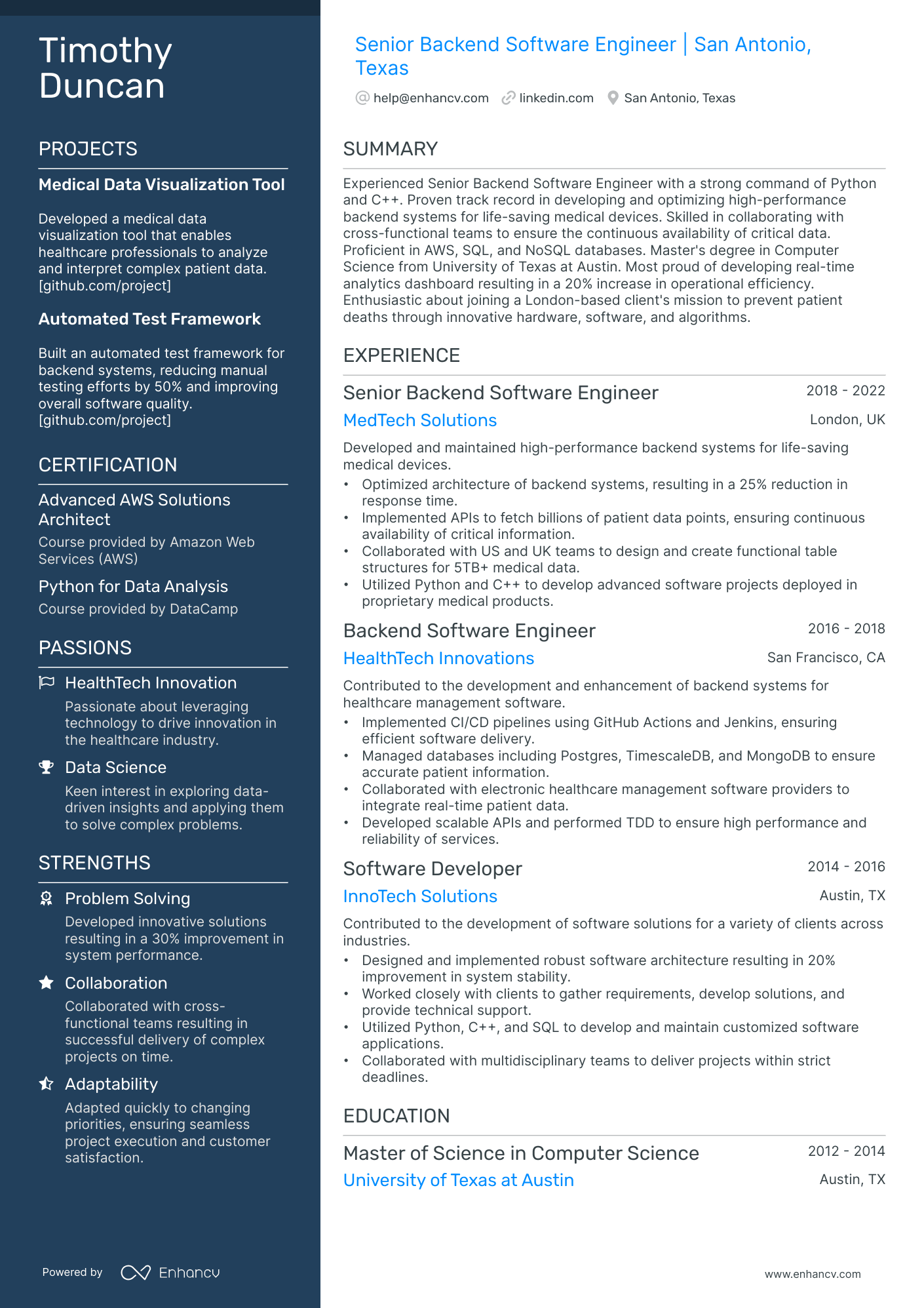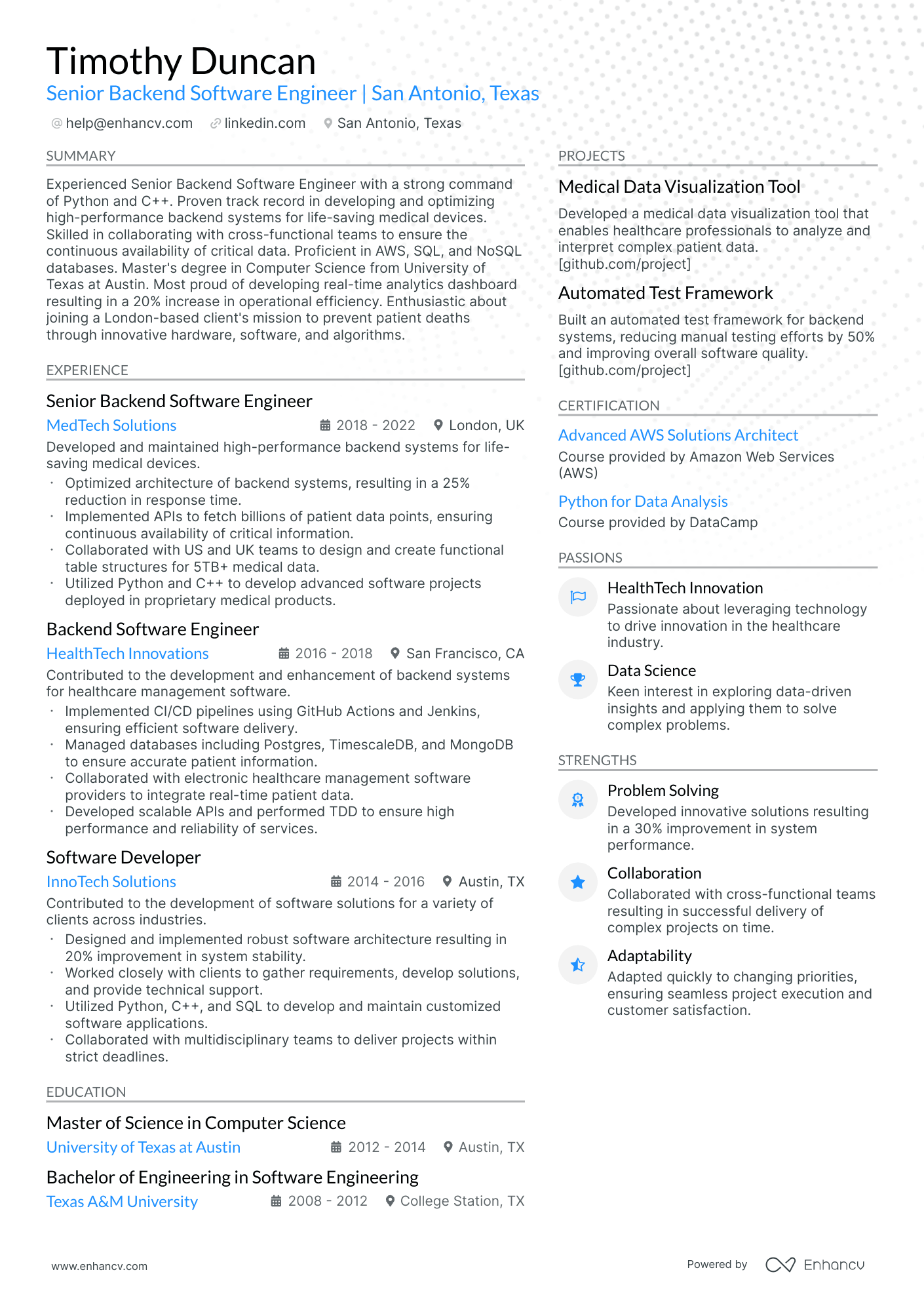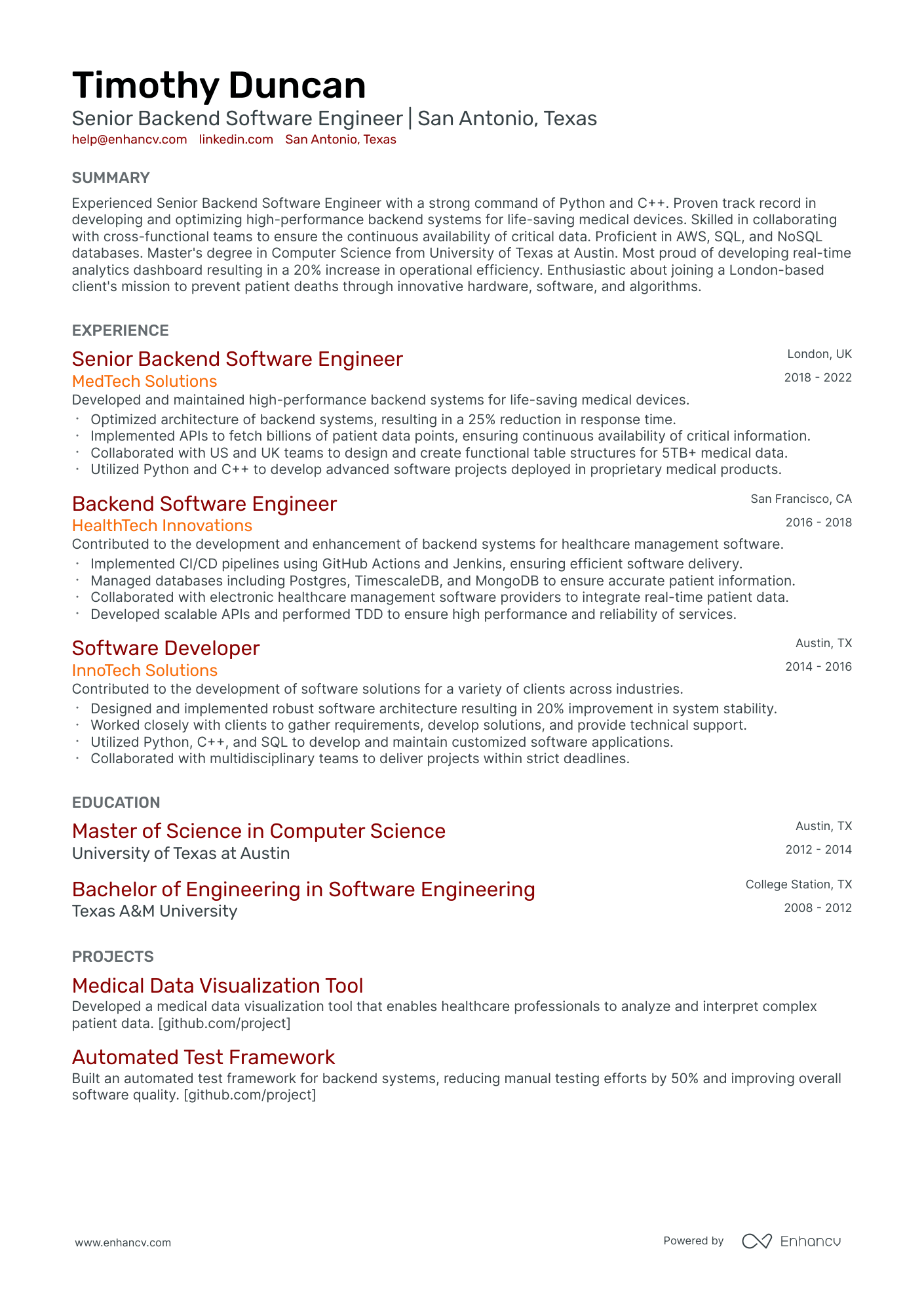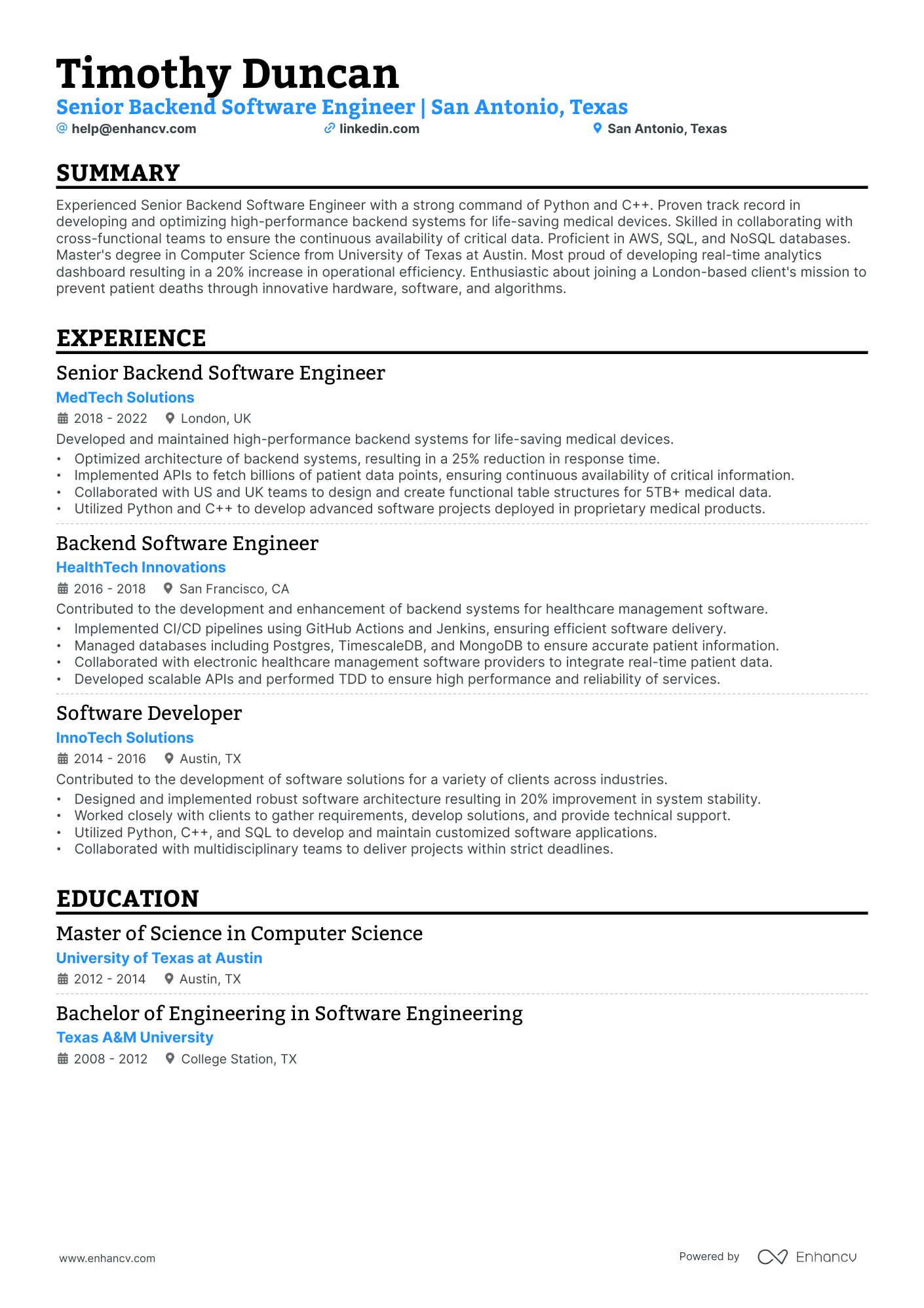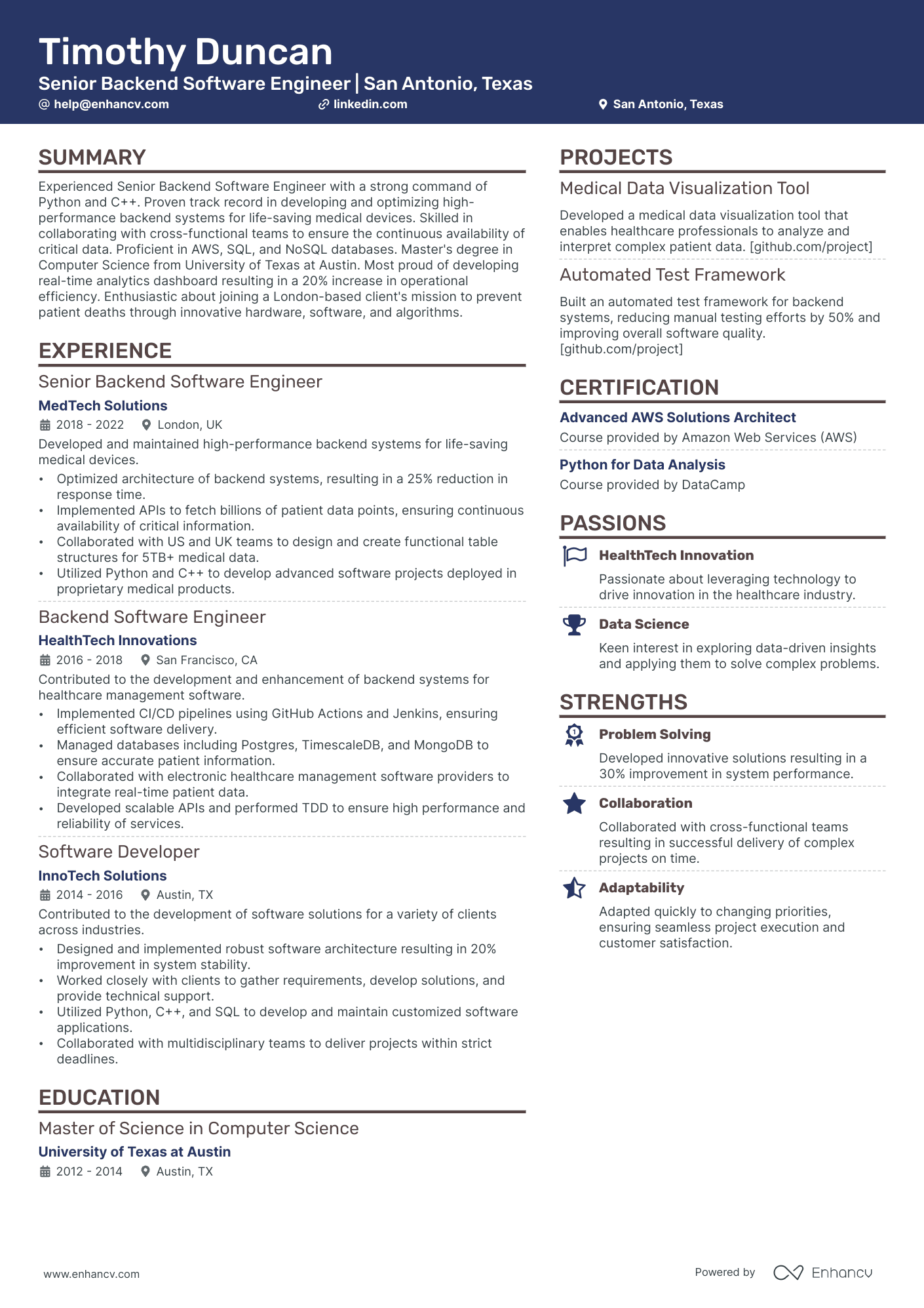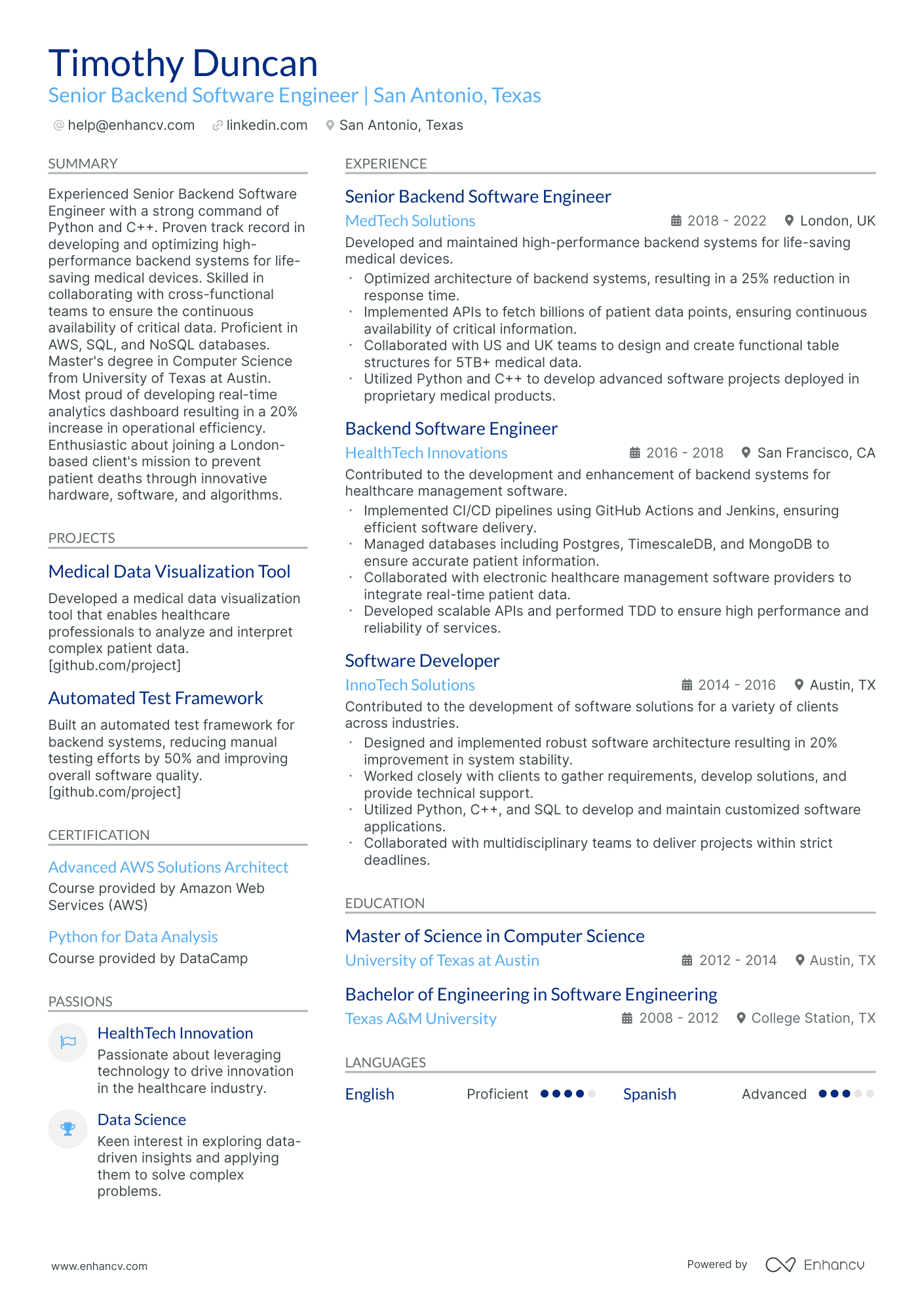A significant resume challenge faced by a cloud security engineer is effectively communicating their technical skills and relevant experience in a clear, concise manner to non-technical hiring managers. Our guide can assist in overcoming this challenge by offering industry-specific examples and templates that help translate complex technical jargon into understandable achievements and responsibilities, ensuring your extensive expertise is easily recognized by any reader.
Dive into our concise guide to learn how to:
- Show your cloud security engineer career's brightest moments through your resume's summary, objective, and experience sections.
- Explore top-notch cloud security engineer resume examples to understand how to distinguish yourself from other candidates.
- Identify the most sought-after cloud security engineer skills and certifications in the industry.
- Design a structured yet unique resume layout.
Recommended reads:
Demystifying the cloud security engineer resume format
While a touch of creativity can be appealing, it's the clarity and relevance of your cloud security engineer resume format that truly resonates with recruiters.
To ensure your resume not only captures attention but also maintains it, consider these four streamlined steps:
- If your career boasts a wealth of pertinent and recent accomplishments, the reverse-chronological resume format is your ally. It naturally emphasizes your experience, placing your most recent roles at the forefront.
- Design a straightforward header: incorporate your contact information, a headline reflecting the position you're vying for or your current designation, and a link to your professional portfolio.
- While brevity is key, if you're targeting a senior position or have accumulated over ten years of industry-relevant experience, extending your resume to two pages is permissible.
- To ensure consistent formatting across various platforms, always save and submit your cloud security engineer resume as a PDF.
Align your resume with the market’s standards – Canadian resumes may have unique layout guidelines.
Upload your resume
Drop your resume here or choose a file. PDF & DOCX only. Max 2MB file size.
Pro tip
While color can enhance your cloud security engineer resume by emphasizing key details like headlines, job titles, and degrees, moderation is key. Stick to a primary and a secondary color to maintain professionalism and avoid a cluttered appearance.
To craft a compelling client partner resume, focus on these sections:
- A scannable header
- A snapshot of your professional persona, showcasing soft skills, achievements, and a summary or objective
- Skills that align with the job advert
- Quantifiable achievements in your experience section
- An education and technical skills section that underscores your proficiency with specific tools or software
What recruiters want to see on your resume:
- Knowledge of cloud platforms (AWS, Azure, Google Cloud) and security features or services they offer. Specific certifications, like AWS Certified Security Specialty, could be notably beneficial.
- Experience with security tools and technologies such as firewalls, intrusion detection systems (IDS), encryption, identity access management (IAM), and secure software development.
- Demonstrated understanding of regulatory standards and compliance requirements such as GDPR, HIPAA, ISO 27001, or SOC 2 Type II.
- Ability to conduct vulnerability assessments and implement remediation strategies in a cloud environment.
- Experience in incident response and disaster recovery planning specifically within a cloud context.
Recommended reads:
Designing your cloud security engineer resume experience to grab recruiters' attention
For the cloud security engineer position, it's crucial to show how your expertise matches what they're looking for.
Your resume experience section can be a game-changer. Ensure you:
- Feature roles most relevant to the cloud security engineer job you're targeting.
- Avoid diving too deep into ancient history - unless what you did a decade ago is super relevant to the cloud security engineer role.
- Structure each bullet to first describe what you did, followed by the skills you utilized, and then the impact of your efforts.
- Quantify your achievements with numbers, possibly highlighting the broader impact on the organization.
- Emphasize transferable skills - those you've gained in past roles that could be valuable in your new role. This showcases your unique professional value.
Crafting the experience section doesn't mean detailing every job you've ever had. Check out the cloud security engineer resume samples below to see how top professionals present their experience.
- Developed and implemented Cloud Security policies and procedures, ensuring compliance with industry standards.
- Performed security assessments and penetration testing on cloud infrastructure resulting in enhanced security measures.
- Collaborated with cross-functional teams to design and deploy secure cloud architectures for clients.
- Managed the deployment of security controls and monitoring systems for cloud-based applications.
- Conducted regular vulnerability assessments and implemented remediation measures to maintain a secure cloud environment.
- Assisted in incident response and forensics investigations related to cloud security breaches.
- Designed and implemented identity and access management solutions for cloud platforms resulting in improved user authentication and authorization processes.
- Developed and maintained security automation scripts to streamline security operations in the cloud environment.
- Led the implementation of cloud security best practices across multiple projects.
- Conducted security audits and risk assessments on cloud infrastructure to identify vulnerabilities and recommend mitigation strategies.
- Implemented encryption mechanisms and data protection controls for sensitive information stored in the cloud.
- Collaborated with DevOps teams to integrate security controls into the CI/CD pipeline.
- Developed and maintained cloud security architecture frameworks, ensuring compliance with regulatory requirements.
- Implemented log management and monitoring solutions for real-time detection of security incidents in the cloud environment.
- Participated in incident response activities and conducted post-incident analysis to identify areas for improvement.
- Designed and implemented cloud data protection strategies, including backup and disaster recovery plans.
- Led a team of engineers in conducting vulnerability assessments and penetration testing on cloud infrastructure resulting in strengthened security posture.
- Developed and delivered cloud security training programs for internal teams and clients.
- Performed threat modeling and risk analysis on cloud architectures, identifying potential security gaps and proposing mitigation measures.
- Collaborated with development teams to implement secure coding practices and conduct code reviews in cloud-based applications.
- Managed security incidents and coordinated with external vendors for timely resolution.
- Led the design and implementation of security controls for multi-cloud environments resulting in enhanced data protection across platforms.
- Developed and maintained cloud security policies and standards, ensuring alignment with industry best practices.
- Participated in client engagements to provide expert advice on cloud security architecture and governance.
- Conducted security assessments and audits on cloud service providers, evaluating their compliance with security standards and contractual obligations.
- Implemented secure configurations and access controls for cloud infrastructure components.
- Collaborated with incident response teams to investigate and resolve security breaches in cloud environments.
- Assisted in the development and deployment of security policies and procedures for a cloud-based data management platform.
- Participated in the evaluation and selection of cloud security solutions and vendors.
- Provided technical guidance and support to development teams on secure coding practices for cloud applications.
The following content includes information from "O*NET OnLine" by the U.S. Department of Labor, Employment and Training Administration (USDOL/ETA). Used under the CC BY 4.0 license. The data represents the top responsibilities present on the task lists for cloud security engineer professionals.
Top Responsibilities for Cloud Security Engineer:
- Develop plans to safeguard computer files against accidental or unauthorized modification, destruction, or disclosure and to meet emergency data processing needs.
- Monitor current reports of computer viruses to determine when to update virus protection systems.
- Encrypt data transmissions and erect firewalls to conceal confidential information as it is being transmitted and to keep out tainted digital transfers.
- Perform risk assessments and execute tests of data processing system to ensure functioning of data processing activities and security measures.
- Modify computer security files to incorporate new software, correct errors, or change individual access status.
- Review violations of computer security procedures and discuss procedures with violators to ensure violations are not repeated.
- Document computer security and emergency measures policies, procedures, and tests.
- Confer with users to discuss issues such as computer data access needs, security violations, and programming changes.
- Monitor use of data files and regulate access to safeguard information in computer files.
- Coordinate implementation of computer system plan with establishment personnel and outside vendors.
Quantifying impact on your resume
<ul>
Strategies for candidates with limited or no experience
Even if you're light on experience, other facets of your cloud security engineer resume can resonate with job requirements:
- Education: Detail skills acquired that dovetail with job expectations.
- Internships & Temporary Roles: Spotlight roles that underscore your relevant expertise.
- Skills: Address both foundational and nuanced job qualifications.
- Strengths & Achievements: Illuminate the distinct value you bring, even if you're newer to the industry.
Recommended reads:
Pro tip
Boost your resume by focusing on the practical aspects of each job requirement. While it's good to have job-related keywords on your resume, ensure they're backed by action verbs and quantifiable data. This gives recruiters a clear picture of your cloud security engineer professional journey.
Cloud security engineer resume skills: showcasing both hard and soft skills
Your cloud security engineer resume should show recruiters your range of skills. List the tools and software you use (hard skills) and how they fit into your daily tasks. But don't stop there. Share the personal traits (soft skills) you've gained from your experiences. Here's how:
- Showcase three top career achievements.
- For each achievement, mention a hard and a soft skill you used.
- Highlight unique skills that set you apart.
- Discuss how your skills improved the workplace or team culture.
Check our list for popular hard and soft skills in the industry.
Top skills for your cloud security engineer resume:
AWS Security
Azure Security
Google Cloud Platform Security
Identity and Access Management (IAM)
Encryption Technologies
Network Security
Cloud Compliance Standards (e.g., GDPR, HIPAA)
Security Information and Event Management (SIEM)
Vulnerability Assessment Tools
Container Security (e.g., Docker, Kubernetes)
Problem Solving
Communication
Attention to Detail
Analytical Thinking
Team Collaboration
Adaptability
Time Management
Critical Thinking
Decision Making
Project Management
Next, you will find information on the top technologies for cloud security engineer professonals from "O*NET OnLine" by the U.S. Department of Labor, Employment and Training Administration (USDOL/ETA). Used under the CC BY 4.0 license.
Top technologies for Cloud Security Engineer’s resume:
- Google Angular
- Spring Framework
- Amazon Elastic Compute Cloud EC2
- Blackboard software
- NortonLifeLock cybersecurity software
- Stack smashing protection SSP software
Pro tip
If the job emphasizes team or organizational culture, dedicate a section of your resume to underscore your strengths and achievements. Top-tier cloud security engineer candidates also highlight their alignment with a company's values and culture.
Highlighting education and certification on your cloud security engineer resume
Your education section is a testament to your foundational knowledge and expertise.
Consider:
- Detailing your academic qualifications, including the institution and duration.
- If you're still studying, mention your anticipated graduation date.
- Omit degrees that aren't pertinent to the job.
- Highlight academic experiences that underscore significant milestones.
For cloud security engineer roles, relevant education and certifications can set you apart.
To effectively showcase your qualifications:
- List all pertinent degrees and certifications in line with the job requirements.
- Include additional certifications if they bolster your application.
- Provide concise details: certification name, institution, and dates.
- If you're pursuing a relevant certification, indicate your expected completion date.
Your education and certification sections validate both your foundational and advanced knowledge in the industry.
Best certifications to list on your resume
- Certified Cloud Security Professional (CCSP) - (ISC)²
- AWS Certified Security - Specialty - Amazon Web Services (AWS)
- Microsoft Certified: Azure Security Engineer Associate - Microsoft
- Certified Secure Software Lifecycle Professional (CSSLP) - (ISC)²
- CompTIA Cloud+ - CompTIA
- Google Cloud Certified - Professional cloud security engineer - Google Cloud
- IBM Certified Solution Advisor - Cloud Security v1 - IBM
Pro tip
The reputation of the institution or organization granting your certification or degree can bolster your credibility. Prioritize recognized and respected credentials.
Recommended reads:
Summary or objective: making your cloud security engineer resume shine
Start your resume with a strong summary or objective to grab the recruiter's attention.
- Use a resume objective if you're newer to the field. Share your career dreams and strengths.
- Opt for a resume summary if you have more experience. Highlight up to five of your top achievements.
Tailor your summary or objective for each job. Think about what the recruiter wants to see.
Resume summary and objective examples for a cloud security engineer resume
Optimize your resume summary and objective for ATS
Drop your resume here or choose a file.
PDF & DOCX only. Max 2MB file size.
Additional sections to amplify your cloud security engineer resume
To further personalize your resume and showcase a broader spectrum of your professional journey, consider adding:
- Projects that highlight your hands-on experience.
- Awards that recognize your industry contributions.
- Volunteer work that underscores your community involvement and soft skills.
- Hobbies that offer a glimpse into your personality and passions.
Key takeaways
- A clear resume layout helps present your info well.
- Use all main resume sections to show how you fit the job.
- Detail specific skills or tasks and their impact.
- Show your personality through interests or hobbies.
- List certifications to back up your technical skills.
